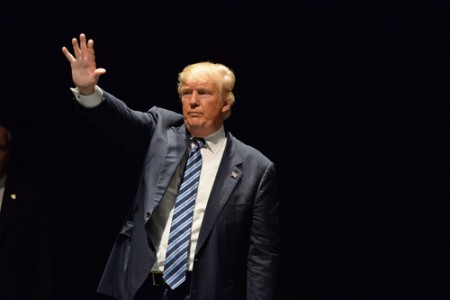Revised travel order bans visa applications from 6 Muslim-majority countries; Iraq excluded

President Donald Trump. Gino Santa Maria / Shutterstock, Inc.
Updated: President Donald Trump has signed a revised executive order that bans for 90 days the issuance of new visas for citizens of six Muslim-majority nations, the Associated Press reports.
At the urging of the Pentagon and State Department, the revised order does not include Iraq because of that country’s efforts against the Islamic State Group.
The order will take effect March 16, the Washington Post reported.
The Trump administration’s earlier travel order, crafted and implemented at the end of his first week in office without providing details to the Congress, Cabinet officials and others in government, caused confusion and pushback, including from the courts.
The new version narrows the order, calling now for a 90-day halt on entry from people from Sudan, Syria, Iran, Libya, Somalia and Yemen unless they already have valid visas. It was crafted to avoid legal issues raised about the earlier order, which included concerns that it created religious preferences: Monday’s order does not contain the same language giving priority to religious minorities that critics had said was there to help Christians into the country while excluding Muslims.
The new order grants exceptions for legal permanent residents of the United States; individuals who have been granted asylum or refugee status; and dual nationals who use a passport from another country, the Washington Post reported.
The new order also suspends the acceptance of refugees for 120 days, though refugees already vetted and scheduled by the State Department will be permitted. After the suspension, the number of refugees entering the country will be capped at 50,000. The Obama administration’s cap was 110,000, the Washington Post reported.
The Department of Homeland Security will also review information given the U.S. for its decision-making for travel visas and immigration by the six nations named under the ban, giving them 50 days to comply with requests to improve the processes.
The Washington Post points out that the revised order does not address all concerns raised by the courts. The San Francisco-based 9th U.S. Circuit Court of Appeals has said that exempting individuals with green cards and visas from an order wouldn’t address their concerns about U.S. citizens with an interest in noncitizens travel.
The American Civil Liberties Union said Monday it would move quickly to prevent the new travel order from taking effect. “We’re going to move very quickly in court to make sure that at least one of the injunctions currently in place around the country remains in place,” Lee Gelernt, deputy director of the ACLU’s Immigrants’ Rights Project, told The Associated Press. The new order does not “eliminate the basic constitutional problem we saw in the first executive order, which is discrimination on the basis of religion. And so we will continue to challenge.”
New York Attorney General Eric T. Schneiderman said in a statement that the intent to discriminate against Muslims is still present in the revised order. “This doesn’t just harm the families caught in the chaos of President Trump’s draconian policies—it’s diametrically opposed to our values, and makes us less safe. My office is closely reviewing the new executive order, and I stand ready to litigate—again—in order to protect New York’s families, institutions, and economy.”
Virginia Attorney General Mark Herring said in a statement: “Although the new order appears to be significantly scaled back, it still sends a horrible message to the world, to Muslim-Americans, and to minority communities across the country, without any demonstrable benefit to national security. We will closely examine this new order to determine its impact, how it may affect our ongoing challenge to the original ban, and whether there are any additional steps we need to take to protect Virginia and our residents.”
Massachusetts Attorney General Maura Healey calls the revised ban “a clear attempt to resurrect a discredited order and fulfill a discriminatory and unconstitutional campaign promise.” The AP says she’s considering all legal options in response.
See also:
Just Security: “A Line-by-Line Comparison Between Trump’s Original Muslim Ban and Today’s”
Last updated 3:24 p.m. to link to executive order.



